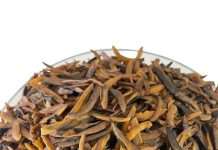Ginger, botanically known as Zingiber officinale from the family Zingiberaceae is a herbaceous perennial flowering plant whose rhizome, ginger root, or ginger, is widely used as a spice and folk medicine. The unique fragrance and flavor of ginger come from its natural oils, the most important of which is gingerol.

It is a natural spice that has been in use for thousands of years as a flavoring agent as well as a natural remedy for the treatment of various conditions, like the common cold, pain, nausea, and others.
Ginger is technically an herb, its root is the most commonly eaten part of the plant. The root can be ground into powder or sliced, and it can be used dry, pickled, or fresh. Regardless of how your ginger is prepared, ginger water can offer some useful health benefits.
Research increasingly points to the value of ginger as a natural diarrhea remedy. Herbal practitioners have long used ginger to prevent muscle spasms. This property of ginger can reduce the frequency of urges to have a bowel movement, and can ease the pain of diarrhea.
Recent research published in the Journal of Food Chemistry Advances, titled “Gingerol: A narrative review of its beneficial effect on human health” revealed that ginger is a valuable food molecule with bioactive constituents such as anti-inflammatory, antiviral, antitumor, antioxidant, and antiemetic effects of essential benefits for human health.
Ginger has been used as a complementary therapy to reduce insulin resistance, liver enzymes, and inflammation. A randomized placebo-controlled clinical trial indicated that ginger supplementation significantly decreased serum levels of alanine aminotransferase, total cholesterol, low-density lipoprotein, fasting blood glucose, and insulin resistance index, in patients with non-alcoholic fatty liver disease.
Nutritionally, ginger is an important part of traditional Indian and Chinese cuisine and has spread throughout the world as a spice for sweet and savory foods.
Many people add ginger to water and tea to add spice and nutrients to their drinks. Ginger water has also commonly been included in folk remedies for conditions like bloating and upset stomachs.
The ginger rhizome contains volatile oil and nonvolatile compounds such as oleoresin. The chemical constituents of ginger are very complex, and so far over 400 compounds have been identified.
Health Benefits of Ginger
Contains gingerol
Ginger has a very long history of use in various forms of traditional and alternative medicine. It’s been used to aid digestion, reduce nausea, and help fight the flu and common cold, to name a few of its purposes.
Treats many forms of nausea, especially morning sickness
Ginger appears to be highly effective against nausea as it may help relieve nausea and vomiting for people undergoing certain types of surgery. Ginger may also help chemotherapy-related nausea, but larger human studies are needed.
May reduce pains
Ginger water may help decrease some types of pain. In a study that involved 60 adults with migraine pain, researchers found using ginger as an add-on therapy was better than taking painkillers alone.
May aid weight loss
In another study, researchers divided 10 men into two groups. One group drank hot ginger water after eating breakfast. The other group did not. The men who drank the ginger water reported greater feelings of fullness.
Although the study was small, and additional studies are necessary, it suggests that ginger water might have a role in weight management. Supplements containing ginger prevented high cholesterol in the bloodstream.
However, more research is needed to determine if ginger would have the same effects on cholesterol levels in humans.
May help reduce chronic indigestion
Chronic indigestion is characterized by recurrent pain and discomfort in the upper part of the stomach.
It’s believed that delayed emptying of the stomach is a major driver of indigestion. Interestingly, ginger has been shown to speed up the emptying of the stomach.
May significantly reduce menstrual pain
Dysmenorrhea refers to pain felt during the menstrual cycle. One of the traditional uses of ginger is for pain relief, including menstrual pain.
In a 2009 study, 150 women were instructed to take either ginger or a nonsteroidal anti-inflammatory drug (NSAID) for the first 3 days of their menstrual period. The three groups received four daily doses of either ginger powder (250 mg), mefenamic acid (250 mg), or ibuprofen (400 mg). Ginger managed to reduce pain as effectively as the two NSAIDs.











